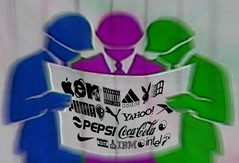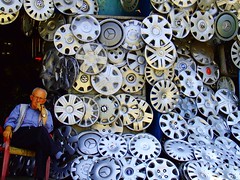Flickr Interlude
Originally uploaded by hytam2
The caption: “His name was Ernie and he drove the fastest Coke truck in Sri Lanka.”
The caption: “His name was Ernie and he drove the fastest Coke truck in Sri Lanka.”
I heard something about this a month or so ago but had not had time to confirm:
It’s official: Aaron Bondaroff aka A-Ron, no longer has anything to do with aNYthing, the very brand he created and that was profiled extensively in both the New York Times Magazine and the Post, not to mention numerous magazines and blogs. The ‘Downtown Don’ apparently didn’t have any kind of deal ironed out and somehow managed to hand his entire company over to an investor he took on.
See the Complex post for a bit more, including talk of a trademark infringement lawsuit.
A-Ron’s new(ish) online home is The New York Glob.
I’ll try to get a bit more on all this in the weeks ahead.

the masterplan
Originally uploaded by s_p_a_c_e_m_a_n
The caption: “Economy vs. Sustainability.”
So today is the big day: The Radiohead release that the music-and-marketing blognoscenti have been spazzing about for a week. As you know, the former EMI band is currently label-free, and has offered consumers a chance name their own price for the band’s next album, In Rainbows, which is available for download today. I can understand the excitement: Any excuse to beat the Big-Labels-Are-Over drum (Thom Yorke has mused that “the time is at hand when you have to ask why anyone needs” a label), plus there’s the consumer empowerment angle. It’s a paradigm shifter, y’all!
Is it? Well, it’s definitely an interesting experiment, and I’m be curious to see how it works out, like everybody else. This morning I named my price. Based on my past experience of Radiohead, I guessed that I would like approximately one song. You can’t hear samples in advance, and you have to buy the whole set of ten tracks anyway, so I went with $1, or about half a British pound. The transaction fee added another half-pound, so really I ended up paying around $2. (Despite reports that the site’s servers were overwhelmed, I had no problems. After one listen, I like the track “Bodysnatchers,” and ambivalent-to-against the rest.)
Perhaps this experiment will tell us something about the future of the music business, but there are some pretty important caveats that are worth keeping in mind. The caveats, and the stuff that I think is actually noteworthy, are after the jump. Sorry for the rambling post. Read more

Specialisation
Originally uploaded by robokow
The caption reads: “One of the things that I find different in Istanbul, compared to most European cities, are the shops. You find *many* shops specialised in just one thing.”
Every company wants its name and logo to be recognized by U.S. consumers. You know, brand equity and all that. Still, most firms could probably do without their employees (or customers) getting popped while wearing clothing bearing its name. As was the case with the 18 recent arrestees pictured in the mug shots on the following pages.
Pretty good. But remember: Innocent till proven guilty.
Via Adfreak.
 One2Believe: Christian action figures hit the mainstream.
One2Believe: Christian action figures hit the mainstream.
David Socha had a problem with the toy aisle: Too many dolls for girls promoted promiscuity, and too many action-figure collections for boys included villainous demon types — or “spawns of Satan,” as he puts it. “The bigger subject is that evil is glorified,” he says. “Like it’s kind of cool to break the Ten Commandments and do things that even 20 years ago people wouldn’t think about promoting — just being as violent and overt as possible.” Socha, who happens to be in the toy business himself, figured that enough parents felt this way to make up a market. And among the retailers with some faith in that notion was Wal-Mart, which this summer began selling Biblical figures made by Socha’s company in more than 400 of its stores. …
Continue reading at the NYT Magazine site.
Once again I’m away from home with little time to post, but to follow up the earlier bit about the Blackwater Brand, I had to pass along this BoingBoing link about Get Your War On, which asks, “Why not just call themselves Deathfang’s Midnight Posse of Merciless Skull Warriors?” (Thanks also to JKD on this.)
Many great images to choose from by our friend Amy Evans. I went with this one, but it’s a good bet I’ll go back for more.
I am startled to learn, via Unbeige, that Herbert Muschamp has died. Here is the obituary. Unbeige’s post suggests a trip to the Times archive to “curate your own Muschamp tribute,” a suggestion I would normally ignore. But I have admired his writing many times (I never met him; by the time I was around the NYT, I’d decided that it’s sometimes better for me to never meet my writing heroes), and there’s one piece in particular that has stuck with me for, wow, 14 years now.
It’s this one, from 1993, the year of the bomb attack on the World Trade Center that failed to bring it down but that was, trust me, pretty unnerving just the same. I was young and newish to New York at the time, but I don’t think I was the only one who felt that way.
We all know that a society’s tallest buildings — the ones that are most easily seen by the most people — reveal what’s that society revolves around: In one era it’s churches, in another palaces, in another, corporate HQs. This essay was headlined “Things Generally Wrong In The Universe,” and in a way it made a case that the tallest building had become the the one that is exploding. That’s the one we all see.
Of course I’m not able to say what he did as well as he did and my clumsy interpretation is probably a disservice, so here’s a passage:
Exploding buildings are this community’s landmarks — its inverted arches of triumph, its sinister Taj Mahals. They provide images of a collective experience that is otherwise elusive. Traditionally, we look to buildings to provide symbols of social cohesion. Exploding buildings now perform an equivalent symbolic role. People may build in different styles, but explosions are universal. Though each may have a different cause, they become linked in our perceptions to some fearful grand design. They focus public attention. They fill up TV screens. The World Trade Center bombing spawned a new style of disaster T-shirt.
Maybe it’s better to just link.
So I happened upon this glowing account of yet another consumer-generated ad stunt, this one for Friendly’s.
For the iScream campaign, consumers were encouraged to “show their love for Friendly’s ice cream or life itself” by posting original photos and videos to the www.iscreamfriendlys.com microsite.
Right, right, the usual thing. Of course it’s rare that there’s enough raw brand fandom around to make these things work, so as usual this consumer revolution is incentivized: The best photos and videos would get prizes. And those were? Apple “sprees” of $10,000, $5,000, and $2,500, plus a bunch of secondary prizes like iPods and Macs. (And a few Canon products.)
I guess $10,000 worth of Friendly’s ice cream wasn’t going to cut it.
Anne Elizabeth Moore points to this Brandweek article:
Japanese car shoppers who test drove a Nissan vehicle were given a free logoed coffee mug for their time as a thank you. At least one consumer probably wished he had said, “No, thank you.”
According to reports, after drinking from the China-made freebie, he felt ill. It was later discovered that the mug contained excessive amounts of lead. More than 140,000 mugs were subsequently recalled. . . .
[Join and contribute to the Murketing Flickr group]